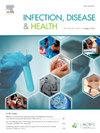Government funding for healthcare infection prevention research: A scoping review of the past decade
IF 2
Q2 PUBLIC, ENVIRONMENTAL & OCCUPATIONAL HEALTH
引用次数: 0
Abstract
Background
Healthcare infection prevention and control (IPC) programs are recognised globally as a system-wide strategy to support patient and staff safety. Research evidence is essential to underpin these programs, however it is unclear the level of national research funding invested into healthcare IPC in the past decade.
Methods
Scoping review using Arksey and O'Malley's framework. A systematic search of national category 1 grants awarded between 2014 and 2023 on healthcare IPC was undertaken. Grants were eligible if they were focused on healthcare IPC, we excluded preclinical studies and vaccine development studies. Two independent reviewers screened and extracted data, result were summarised narratively.
Results
We identified 10,394 grants, amounting to $19.7B, awarded between 2014 and 2023. A total of $37.11M was provided for 23 IPC research projects/programs (median per grant $1.10M, interquartile range 335k to 2.44M). Accounted for approximately 0.19 % of the total government health research funding in Australia from 2014 to 2023. No healthcare IPC related grants were awarded in 2020, the peak of the pandemic.
Conclusion
IPC research funding in Australia remains disproportionately low relative to infection health and economic burden.
政府资助的卫生保健感染预防研究:过去十年的范围审查。
背景:医疗感染预防和控制(IPC)计划是全球公认的支持患者和工作人员安全的全系统战略。研究证据对于支持这些规划至关重要,然而,在过去十年中,尚不清楚国家对卫生保健IPC的研究资金投入水平。方法:使用Arksey和O'Malley的框架进行范围审查。对2014年至2023年在医疗保健IPC方面获得的国家1类赠款进行了系统搜索。如果资助的重点是卫生保健IPC,我们排除了临床前研究和疫苗开发研究。两名独立评审员对数据进行筛选和提取,并对结果进行叙述总结。结果:我们确定了2014年至2023年间颁发的10,394项赠款,总额为197亿美元。总共为23个IPC研究项目/项目提供了3711万美元(每笔拨款中位数为110万美元,四分位数范围为33.5万至244万美元)。约占2014年至2023年澳大利亚政府卫生研究经费总额的0.19%。在大流行高峰期的2020年,没有发放与卫生保健IPC相关的赠款。结论:相对于感染健康和经济负担,澳大利亚的IPC研究经费仍然低得不成比例。
本文章由计算机程序翻译,如有差异,请以英文原文为准。
求助全文
约1分钟内获得全文
求助全文
来源期刊

Infection Disease & Health
PUBLIC, ENVIRONMENTAL & OCCUPATIONAL HEALTH-
CiteScore
5.70
自引率
5.70%
发文量
40
审稿时长
20 days
期刊介绍:
The journal aims to be a platform for the publication and dissemination of knowledge in the area of infection and disease causing infection in humans. The journal is quarterly and publishes research, reviews, concise communications, commentary and other articles concerned with infection and disease affecting the health of an individual, organisation or population. The original and important articles in the journal investigate, report or discuss infection prevention and control; clinical, social, epidemiological or public health aspects of infectious disease; policy and planning for the control of infections; zoonoses; and vaccination related to disease in human health. Infection, Disease & Health provides a platform for the publication and dissemination of original knowledge at the nexus of the areas infection, Disease and health in a One Health context. One Health recognizes that the health of people is connected to the health of animals and the environment. One Health encourages and advances the collaborative efforts of multiple disciplines-working locally, nationally, and globally-to achieve the best health for people, animals, and our environment. This approach is fundamental because 6 out of every 10 infectious diseases in humans are zoonotic, or spread from animals. We would be expected to report or discuss infection prevention and control; clinical, social, epidemiological or public health aspects of infectious disease; policy and planning for the control of infections; zoonosis; and vaccination related to disease in human health. The Journal seeks to bring together knowledge from all specialties involved in infection research and clinical practice, and present the best work in this ever-changing field. The audience of the journal includes researchers, clinicians, health workers and public policy professionals concerned with infection, disease and health.
 求助内容:
求助内容: 应助结果提醒方式:
应助结果提醒方式:


